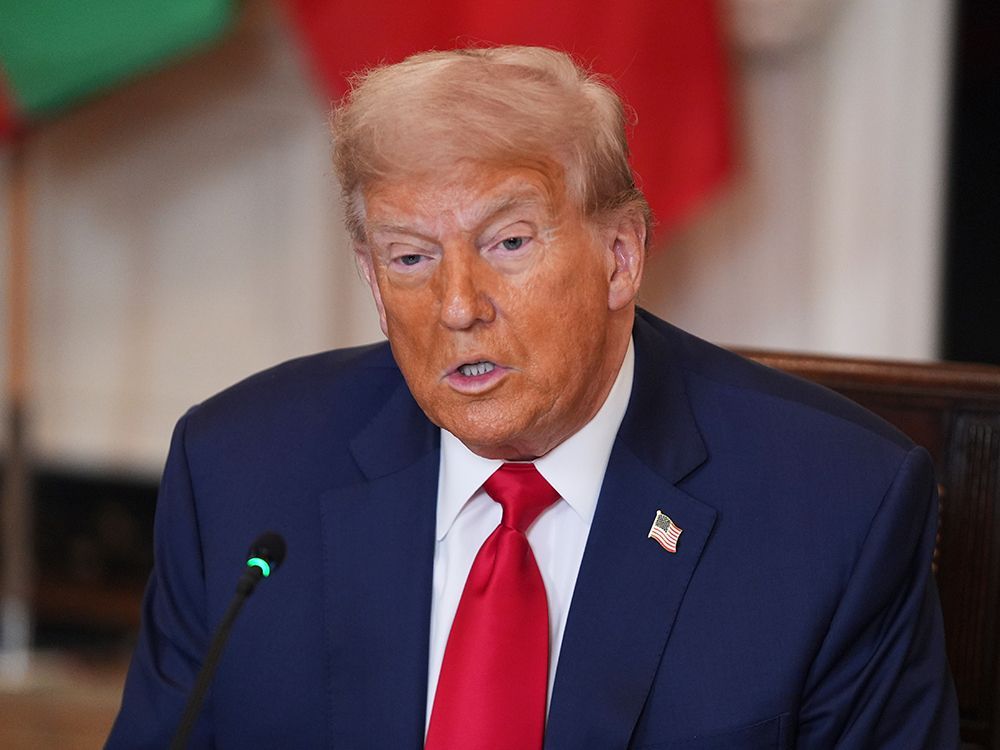
United States President Donald Trump appeared to escalate his trade brinksmanship with Canada on Thursday, declaring that the U.S. would impose a tariff of 35 per cent on Canadian goods starting Aug. 1
“As you are aware, there will be no Tariff if Canada or companies within your Country, decide to build or manufacture product within the United States,” Trump wrote in an open letter addressed to Prime Minister Mark Carney, which he posted on his Truth Social account.
Trump said the tariff would apply “separate” from sectoral tariffs already in place and that, should Canada retaliate with additional tariffs, “Whatever number you choose to raise them by, will be added onto the 35 per cent that we charge.”
In the letter, Trump accused Canada of failing to address the flow of fentanyl into the United States, claiming Canada had instead retaliated “with its own tariffs.”
Trump has used fentanyl as the basis for his use of the International Emergency Economic Powers Act, under which he first imposed 25 per cent tariffs on all goods from Canada and Mexico in February. Goods that qualify under the Canada-United-States-Mexico Agreement (CUSMA) are currently exempted from those tariffs, and it was not immediately clear if such goods would be exempt from the higher tariffs as well.
Since February, Ottawa has taken major steps to address the flow of fentanyl at the Canada-U.S. Border, including billions in investments on more border security and the appointment of former RCMP deputy Commissioner Kevin Brosseau as Canada’s “fentanyl czar” to tackle the issue. Carney’s government has also tabled new legislation that aims to give more powers to security agencies at the border.
“If Canada works with me to stop the flow of Fentanyl, we will, perhaps, consider an adjustment to this letter,” Trump wrote. “These tariffs may be modified, upward or downward, depending on our relationship with your country.”
Trump also took issue with Canada’s supply management system in the letter, claiming Canada charges American dairy farmers “up to 400 per cent” in tariffs.
Canada’s supply management system has long been a trade irritant for the United States and other trading partners. Parliament recently passed legislation sponsored by the Bloc Québécois last month, that protects the system from any concessions in future trade negotiations.
Carney’s government and the Trump administration have been in talks for a new security and economic deal since early May, with both parties setting a deadline for an agreement by July 21. If no deal is reached, Carney has promised to adjust retaliatory tariffs against U.S. steel and aluminum products “consistent” with the progress made with the negotiations with the U.S.
Just two weeks ago, Trump halted negotiations “effective immediately” because the U.S. took issue with Canada’s implementation of its digital services tax against U.S. tech giants. Just two days later, Canada announced it would rescind the tax, “in anticipation of a mutually beneficial comprehensive trade arrangement with the United States.”
Since Monday, Trump has sent nearly two dozen letters to trading partners, informing each country of their “reciprocal” tariff rates effective Aug. 1. Levies ranged from a 25 per cent tariff rate on Japan to a 50 per cent tariff rate on Brazil.